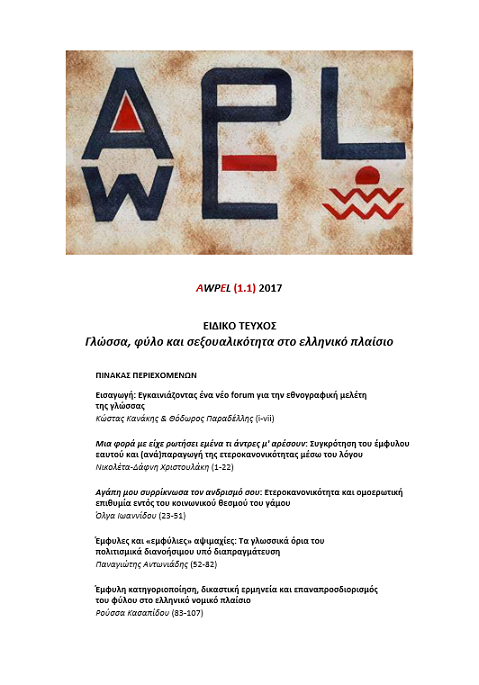Μια φορά με είχε ρωτήσει εμένα τι άνδρες μ'αρέσουν: Συγκρότηση του έμφυλου εαυτού και (ανα)παραγωγή της ετεροκανονικότητας μέσω του λόγου
Abstract
This paper aims to explore how articulations of gender and sexuality and dominant ideas about them emerge through language use. A brief overview of the trajectory of sociolinguistic studies on gender and sexuality is followed by the critical analysis of a short conversation among friends. The notions of member categorization devices, indexicality and communities of practice are central to this analysis. Based on the data, it is argued that gender and sexuality can be constructed and negotiated through everyday conversations in multiple ways, at times conforming to dominant norms and at times disregarding them. Power relations seem to influence the communicative practices employed in the ongoing construction of the gendered and sexual self through linguistic interaction, in which the pervasiveness of heteronormativity is unmissable.
Article Details
- Come citare
-
Χριστουλάκη Δ.-Ν. (2017). Μια φορά με είχε ρωτήσει εμένα τι άνδρες μ’αρέσουν: Συγκρότηση του έμφυλου εαυτού και (ανα)παραγωγή της ετεροκανονικότητας μέσω του λόγου. Aegean Working Papers in Ethnographic Linguistics, 1(1), 1–22. https://doi.org/10.12681/awpel.14416
- Sezione
- Articles

TQuesto lavoro è fornito con la licenza Creative Commons Attribuzione 4.0 Internazionale.
Authors who publish with this journal agree to the following terms:
Authors retain copyright and grant the journal right of first publication with the work simultaneously licensed under a Creative Commons Attribution licence that allows others to share the work with an acknowledgement of the work's authorship and initial publication in this journal.
Authors are able to enter into separate, additional contractual arrangements for the non-exclusive distribution of the journal's published version of the work (e.g. post it to an institutional repository or publish it in a book), with an acknowledgement of its initial publication in this journal.
Authors are permitted and encouraged to post their work online (preferably in institutional repositories or on their website) prior to and during the submission process, as it can lead to productive exchanges, as well as earlier and greater citation of published work (See The Effect of Open Access).



